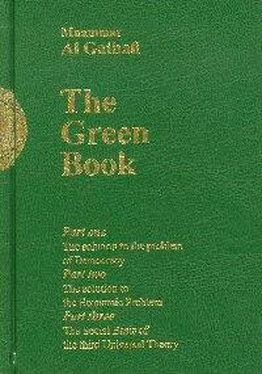Muammar Al-Gathafi - The Green Book
Здесь есть возможность читать онлайн «Muammar Al-Gathafi - The Green Book» весь текст электронной книги совершенно бесплатно (целиком полную версию без сокращений). В некоторых случаях можно слушать аудио, скачать через торрент в формате fb2 и присутствует краткое содержание. Город: London, Год выпуска: 1976, Издательство: Martin, Brian & O'Keeffe, Жанр: Политика, на английском языке. Описание произведения, (предисловие) а так же отзывы посетителей доступны на портале библиотеки ЛибКат.
- Название:The Green Book
- Автор:
- Издательство:Martin, Brian & O'Keeffe
- Жанр:
- Год:1976
- Город:London
- ISBN:нет данных
- Рейтинг книги:3 / 5. Голосов: 1
-
Избранное:Добавить в избранное
- Отзывы:
-
Ваша оценка:
- 60
- 1
- 2
- 3
- 4
- 5
The Green Book: краткое содержание, описание и аннотация
Предлагаем к чтению аннотацию, описание, краткое содержание или предисловие (зависит от того, что написал сам автор книги «The Green Book»). Если вы не нашли необходимую информацию о книге — напишите в комментариях, мы постараемся отыскать её.
British spelling.
The Green Book — читать онлайн бесплатно полную книгу (весь текст) целиком
Ниже представлен текст книги, разбитый по страницам. Система сохранения места последней прочитанной страницы, позволяет с удобством читать онлайн бесплатно книгу «The Green Book», без необходимости каждый раз заново искать на чём Вы остановились. Поставьте закладку, и сможете в любой момент перейти на страницу, на которой закончили чтение.
Интервал:
Закладка:
Ignorance will come to an end when everything is presented as it actually is and when knowledge about everything is available to each person in the manner that suits him or her.
MUSIC AND ART
Humans, being backward, are still unable to speak one common language. Until this human aspiration is attained, which seems impossible, the expression of joy and sorrow, of what is good and bad, beautiful and ugly, comfortable and miserable, mortal and eternal, love and hatred, the description of colours, sentiments, tastes and moods—all will be expressed according to the language each person speaks spontaneously. Behaviour itself will result from the reaction produced by the feeling that the language creates in the speaker’s mind.
Learning a single language, whatever it may be, is not the solution for the time being. It is a problem that will inevitably remain without solution until the process of the unification of languages has passed through time, provided that the hereditary factor loses its effect on subsequent generations through the passage of sufficient time. The sentiment, taste and mood of ancestors form those of their descendants. If those ancestors spoke different languages and their children, on the contrary, speak a single language, the off-spring would not necessarily share common tastes in virtue of speaking a common language. Such common tastes can be achieved only when the new language imparts the taste and the sense transmitted by inheritance from one generation to another.
If one group of people wears white clothes in mourning and another group puts on black, the sentiment of each group will be adjusted according to these two colours, i.e., one group rejects the black colour on such an occasion while the other one prefers it, and vice versa. Such a sentiment leaves its physical effect on the cells as well as on the genes in the body. This adaptation, will be transmitted by inheritance. The inheritors automatically reject the colour rejected by the legator as a result of inheriting the sentiment of their legator. Consequently, people are only harmonious with their own arts and heritage. They are not harmonious with the arts of others because of heredity, even though those people, who differ in heritage, speak a single common language.
Such a difference emerges between the groups of one people, even if it is on a small scale.
To learn a single language is not the problem, and to understand others’ arts as a result of learning their language is also not the problem. The problem is the impossibility of a real intuitional adaptation to the language of others.
This will remain impossible until the effects of heredity, which are transmitted in the human body, come to an end.
Mankind is still backward because humans do not communicate in one inherited common language. It is only a matter of time before mankind, achieves that goal, unless civilization should relapse.
SPORT, HORSEMANSHlP AND THE STAGE
Sport is either private, like the prayer which one performs alone inside a closed room, or public, performed collectively in open places, like the prayer which is practised corporately in places of worship. The first type of sport concerns the individuals themselves, while the second type is of concern to all people. It must be practised by all and should not be left to anyone else to practise on their behalf. It is unreasonable for crowds to enter places of worship just to view a person or a group of people praying without taking part. It is equally unreasonable for crowds to enter playgrounds and arenas to watch a player of a team without participating themselves.
Sport is like praying, eating, and the feelings of coolness and warmth. It is unlikely that crowds will enter a restaurant just to look at a person or a group of people eat. It is also unlikely that they will let a person or a group or people enjoy warmth or ventilation on their behalf. It is equally illogical for the society to allow an individual or a team to monopolize sports while the society as a whole pays the costs of such a monopoly for the exclusive benefit of one person or team. In the same way, people should not allow an individual or a group, whether it is a party, class, sect, tribe or parliament, to replace them in deciding their destiny and in defining their needs.
Private sport is of concern only to those who practise it on their own and at their own expense. Public sport is a public need and the people cannot be either democratically or physically represented by others in its practice. Physically, the representative cannot transmit to others how his body and morale benefit from sport. Democratically, no individual or team has the right to monopolize sport, power, wealth or arms for themselves. Sporting clubs represent the basic organization of traditional sport in the world today. They retain all expenditure and public facilities allocated to sport in every state. These institutions are social monopolistic agencies like all dictatorial political instruments which monopolize authority, economic instruments which monopolize wealth, and traditional military instruments which monopolize arms. As the era of the masses does away with the instruments monopolizing power, wealth and arms, it will, inevitably, destroy the monopoly of social activity in such areas as sports, horsemanship, and so forth. The masses who queue to vote for a candidate to represent them in deciding their destiny act on the impossible assumption that this person will represent them and embody, on their behalf, their dignity, sovereignty and point of view. However, those masses who are robbed of their will and dignity are reduced to mere spectators, watching another person performing what they should naturally be doing themselves.
The same holds true of the crowds who, because of ignorance, fail to practise sport by and for themselves. They are fooled by monopolistic instruments which endeavour to stupefy them and divert them to indulging in laughter and applause instead. Sport, as a social activity, must be for the masses, just as power, wealth and arms should be in the hands of the people.
Public sport is for all the masses. It is right of all people for their health and recreational benefit. It is mere stupidity to leave its benefits to certain individuals and teams who monopolize these while the masses provide the facilities and pay the expenses for the establishment of public sports. The thousands who crowd stadiums to view, applaud and laugh are foolish people who have failed to carry out the activity themselves. They line up lethargically in the stands of the sports grounds, and applaud those heroes who wrest from them the initiative, dominate the field and control the sport and, in so doing, exploit the facilities that the masses provide. Originally, the public grandstands were designed to demarcate the masses from the playing fields and grounds; to prevent the masses from having access to the playing fields. When the masses march and play sport in the centre of playing fields and open spaces, stadiums will be vacant and become redundant. This will take place when the masses become aware of the fact; that sport is a public activity which must be practised rather than watched. This is more reasonable as an alternative than the present costum of a helpless apathetic majority that merely watches.
Grandstands will disappear because no one will be there to occupy them. Those who are unable to perform the roles of heroism in life, who are ignorant of the events of history; who fall short of envisaging the future, and who are not serious enough in their own lives, are the trivial people who fill the seats of the theatres and cinemas to watch the events of life in order to learn their course. They are like pupils who occupy school desks because they are uneducated and also initially illiterate.
Читать дальшеИнтервал:
Закладка:
Похожие книги на «The Green Book»
Представляем Вашему вниманию похожие книги на «The Green Book» списком для выбора. Мы отобрали схожую по названию и смыслу литературу в надежде предоставить читателям больше вариантов отыскать новые, интересные, ещё непрочитанные произведения.
Обсуждение, отзывы о книге «The Green Book» и просто собственные мнения читателей. Оставьте ваши комментарии, напишите, что Вы думаете о произведении, его смысле или главных героях. Укажите что конкретно понравилось, а что нет, и почему Вы так считаете.












